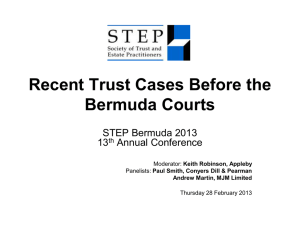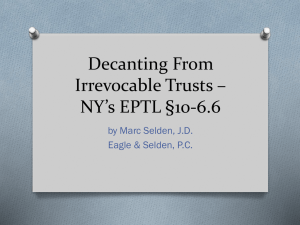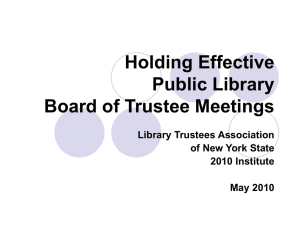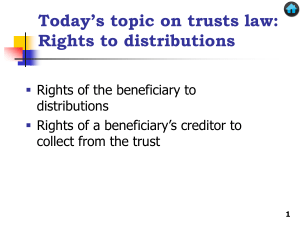Top Ten Document Concerns for Indenture Trustees
advertisement
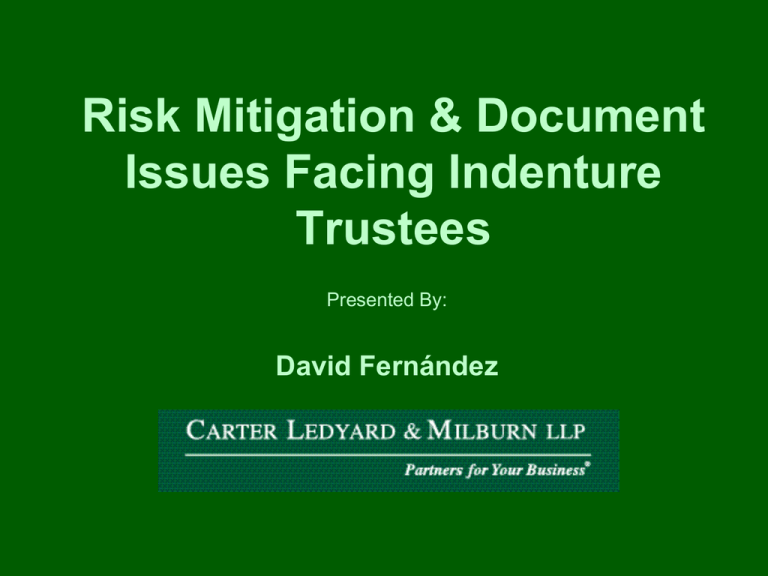
Risk Mitigation & Document Issues Facing Indenture Trustees Presented By: David Fernández Always Remember the Three Monkeys: Hear No Evil, See No Evil, Speak No Evil Hear No Evil Discretion over Investments • What to avoid: Trustee discretion or responsibility over investment selection (even if exculpated from loss) of funds held in trust accounts (and related “Eligible Investments” or “Permitted Investments” issues). – Example: “Funds held in the [_____] Account shall be invested in Eligible Investments selected by the Trustee…” or “Funds held in the [_____] Account shall be invested in Eligible Investments selected by the Borrower or, if the Borrower shall fail for three (3) consecutive Business Days to so instruct the Trustee, by the Trustee.” – This is unacceptable language! Discretion over Investments Dodd-Frank Act’s Definition of “Municipal Advisor” Pursuant to the Dodd-Frank Act, Section 15B of the Securities Exchange Act of 1934 provides for the registration and regulation of “municipal advisors” Section 15B(4)(e) defines the term “municipal advisors” in part: (4) the term “municipal advisor” – (A) means a person (who is not a municipal entity or an employee of a municipal entity) that – (i) provides advice to or on behalf of a municipal entity or obligated person with respect to municipal financial products or the issuance of municipal securities, including advice with respect to the structure, timing, terms, and other similar maters concerning such financial products or issues …” (emphasis added) Discretion over Investments While the Rule is not explicit when it comes to the inclusion of Trustees, the definition does contemplate the regulation of the following persons with respect to municipal entities and obligated persons: - Persons that provide advice with respect to guaranteed investment contracts and investment strategies - Persons that provide advice with respect to municipal derivatives It is the inclusion of “on behalf of” in the definition which should give us pause. The inclusion of these words indicates advice for another person in their best interests, as contrasted with advice solely at an arms length. It is unclear how the SEC will rule on the terms, but we should be wary of how we approach our relationships and avoid circumstances which could be interpreted as a variation away from our typical trustee roles and into one of “municipal advisor.” Discretion over Materiality • What to avoid: Terms calling for “Material adverse affect on bondholders” to be determined by the Trustee. – Example: Indenture amendment section permitting amendments meeting stated criteria, followed by something like: “Notwithstanding any term hereinto the contrary, the Trustee shall not enter into any amendment having a material adverse effect on bondholders.” • The Solution is to always receive direction from another party. See No Evil Affirmative Review of Documentation • What to avoid: Responsibility to affirmatively review or evaluate the terms or mechanics of the agreement (i.e. construction fund requisitions) or to exercise discretion regarding the same. – Example: Terms allowing withdrawal upon requisition “approved by the Trustee” or “in form and content acceptable to the Trustee” or “upon such requisition and supporting materials as the Trustee may require” or calling for surveys, title reports, etc to be “acceptable to the Trustee or as it may require.” – The Fix: NEVER accept this role. Affirmative Review of Documentation (Continued) • What to avoid: Responsibility to affirmatively review or evaluate borrower financial reports, management reports, rebate certificates or continuing disclosure reports. – Example: Terms stating or implying review or approval by the Trustee, or calling for the same to be “in form and content acceptable” to the Trustee; or failing to state affirmatively that the Trustee is not under a responsibility to review or examine the content. – The Fix: Never accept the responsibility to find form and content acceptable. Speak No Evil Waiver of Bondholder Rights • What to avoid: The Trustee may waive any Event of Default hereunder and its consequences and rescind any declaration of maturity of principal of and interest on the Bonds; provided however that the Trustee shall not waive any Event of Default, if there is a draw under a Credit Facility until such time as the stated amount of the Credit Facility shall be reinstated. – Correct Language: The Trustee may waive any Event of Default hereunder and its consequences and rescind any declaration of maturity of principal of and interest on the Bonds upon the written request of the Owners of a majority in aggregate principal amount of all the Bonds then Outstanding; provided however that the Trustee shall not waive any Event of Default, if there is a draw under a Credit Facility until such time as the stated amount of the Credit Facility shall be reinstated. Waiver of Bondholder Rights Novation requests Be aware of recent requests by insurers for novations with respect to their transfers to successor insurers. Many of these requests contain blanket waivers of the resigning insurer and “inadvertent” gaps created by the obligations assumed by the new insurer. Here’s an example: “By signing this Certificate of Consent to Transfer, as the duly authorized representative of the Bondholders, you hereby consent and agree on behalf of the Bondholders: (1) To the transfer by X to Y (the “Transfer”) and the assumption by Y from X (the “Assumption”), of all of X’s rights, title and interest and all future liabilities and obligations, in, to and under the Policy; …” If you consent, you have consented to a gap in coverage without obtaining Bondholder consent, potentially exposing the Trustee to large liability claims. UCC Perfection • Stated or Implied Responsibility for Initial UCC Perfection – What to avoid: “The Trustee shall take such action as may be necessary to perfect the security interest granted hereunder” or “The Trustee shall prepare and file the Initial UCC Statements, and shall take such other actions, as may be necessary to perfect and priority of the security interests granted hereunder.” – It is permissible and standard practice to have the Trustee prepare and file the UCC Continuation Statements. Trustee as “Lender” • What to avoid: Terms treating the Trustee as a “Lender” exercising business discretion (predefault) in the administration of a loan (unless accompanied by a clear objective standard to apply): Example: Covenants prohibiting or restricting actions “unless consented to by the Trustee” or allowing actions “upon such terms as the Trustee may approve” or calling for required opinions or similar deliverables to be “as may be required by the Trustee.” Add language stating the Trustee is acting solely in its capacity as the Trustee. Standard of Care • Avoid any deviation from the commonly accepted pre-default (strictly contractual) and post-default ("prudent person“) Trustee standard of care. – Example: “The Trustee shall take whatever action is necessary to protect the interests of Noteholders.” – The correct statement should read: “Except upon the occurrence and during continuance of an Event of Default the Trustee shall have only such duties as are expressly set forth in the Indenture… Upon the occurrence and during continuance of an Event of Default, the Trustee exercises such of the rights and powers vested in it by the Indenture, using the same degree of care and skill in their exercise, as a prudent person would under the circumstance in the conduct of his or her own affairs.” Jurisdiction & Governing Law • Governing Law of Documents & jurisdiction of lawsuits (these must match) 1. New York Law 2. The law of any State in which the Trustee has an office. 3. The law of the State of the Issuer of the Bonds • Helpful Tip: Always check companion documents to transactions (i.e. Deposit Account Agreements), sometimes those Third Party Providers may try to slip in foreign or other state laws (which may be more bank friendly) as governing law. Do not accept this! Jurisdiction & Governing Law (Continued) • Arbitration – The Trustee should never accept a provision limiting its remedies in arbitration, nor should it ever have to accept arbitration as the only means for dispute resolution. • Trial by Jury – This right should be waived by ALL parties. INDEMNIFICATION Lack of appropriate indemnification, expense recovery or charging lien. Trustee should be provided complete indemnification from any expense, loss and liability (including attorneys fees and expenses) incurred in the acceptance or performance of its duties or administration of the trusts which it has been charged to administer (often qualified to exclude losses caused by its own [gross] negligence or willful misconduct); recovery of amounts owing to the Trustee should be included as a secured obligation in all granting language; and Trustee should be granted a charging lien ahead of bond holders. INDEMNIFICATION (Continued) Save yourself a headache later, and watch out for provisions like this: In the event the Trustee incurs expenses or renders services in the course of performing its duties hereunder, the Trustee shall apply to the Borrower for reimbursement under Section [___] of the Agreement.” The correct language should read: “The Borrower has covenanted and agreed, pursuant to the Agreement to pay to the Trustee compensation for all services rendered by it hereunder and under the other agreements relating to the Bonds to which the Trustee is a party in accordance with the terms agreed to from time to time, and, subsequent to default, in accordance with the Trustee’s thencurrent fee schedule for default administration (the entirety of which compensation shall not be limited by any provision of law regarding compensation). The Trustee shall have a lien prior to the lien securing the Bonds, which it may exercise through a right of setoff, upon all property or funds held or collected by the Trustee pursuant to this Indenture.” Terms to Identify & Remove • The Trustee must NEVER give any indemnification to another party – Example: [From a Deposit Account Control Agreement “. . . To the extent such obligations of indemnity are not satisfied by Company within five (5) days after demand on Company by Bank, Secured Party will indemnify.” where the Trustee is the Secured Party]: • Complete removal from the document is the suggested action. Terms to Identify & Remove (Continued) • “Sovereign Immunity” – Example: From time to time, Issuer’s will affirmatively state their sovereign immunity as a quasi-governmental agency. – To fix this statement, the Trustee has two options: • Complete removal of the statement • Add a waiver with respect to the Trustee Absence of Trustee Protections • There should be an express recitation of the standard, commonly accepted Trustee immunities and protections, such as: Trustee ability to rely on documents it receives in good faith without investigation; ability to receive and rely on advice of counsel; not liable for errors of judgment unless negligent in ascertaining facts; not obliged to take action unless indemnified to its satisfaction against expense and liability (including attorney’s fees); etc. – Example: The correct language should always include: “The Trustee is not required to make any inquiry or investigation into the facts or matters stated in any resolution, certificate, statement, instrument, opinion, report, notice, request, direction, consent, order, approval, bond, debenture or other paper or document other than those created by the Trustee.” Trustee Resignation • Limitations to the time period in which a successor will be appointed after resignation or removal of the Trustee are important – 60 Day Maximum – The Trustee must have the right to petition a court of competent jurisdiction to appoint a successor (at the expense of another party such as the Issuer or the Borrower) Implied or Express terms of Responsibility for Tax-Exempt Qualification •Example: “Notwithstanding any term herein to the contrary, the Trustee will not take any action that would cause interest on the bonds to fail to be exempt from federal taxation.” Or similar terms, in different contexts. – The best solution is to remove this language completely. Notice Via Electronic Means • Helpful Tips 1. Be vigilant as to how notices are permitted under the documents 2. The Trustee can agree to accept and act upon instructions or directions sent by unsecured e-mail, facsimile transmission or other similar unsecured electronic methods as long as the Trustee is protected. 3. Many types of language can be acceptable, but be careful that the language is not too generic. Notice Via Electronic Means (Continued) • Specific Language to include: – The Party giving directions to the Trustee must provide an incumbency certificate listing the designated persons with authority to provide such instructions (including updating the list as needed). – The Trustee has sole discretion to elect to act upon such instructions, and the Trustee’s understanding of such instructions shall be deemed controlling. – The Trustee shall not be liable for any losses, costs or expenses arising directly or indirectly from the Trustee’s reliance upon and compliance with such instructions. – The Party agrees to assume all risks arising out of the use of such electronic instructions and directions to the Trustee. For more information please contact: David J. Fernandez Carter Ledyard & Milburn LLP 2 Wall Street New York, New York 10005 212-238-8661 dfernandez@clm.com
